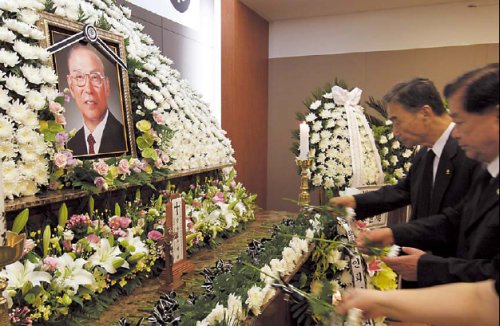Former Capital Defense Commander Chang Tae-wan who tried to put down a coup d’etat attempt by Gen. Chun Doo-hwan on Dec. 12, 1979 died of chronic illness on July 26. He was 79.
The native of Chilgok, North Gyongsang Province became an officer in 1950. He then fought in the Vietnam War as an operational staff officer. He was promoted to the rank of general in 1971 and took over as capital defense commander in November 1979.
About a month later, on Dec. 12, then Security Commander Chun, along with Roh Tae-woo and others from the 11th graduating class of the Korea Military Academy rose in revolt, mobilizing troops to arrest martial law commander and Army Chief of Staff Jeong Seung-hwa without authorization from President Choi Kyu-ha. Chun ordered the arrest of Jeong on charges of conspiring with Kim Jae-kyu to assassinate President Park Chung-hee on Dec. 26, 1979.
The native of Chilgok, North Gyongsang Province became an officer in 1950. He then fought in the Vietnam War as an operational staff officer. He was promoted to the rank of general in 1971 and took over as capital defense commander in November 1979.
About a month later, on Dec. 12, then Security Commander Chun, along with Roh Tae-woo and others from the 11th graduating class of the Korea Military Academy rose in revolt, mobilizing troops to arrest martial law commander and Army Chief of Staff Jeong Seung-hwa without authorization from President Choi Kyu-ha. Chun ordered the arrest of Jeong on charges of conspiring with Kim Jae-kyu to assassinate President Park Chung-hee on Dec. 26, 1979.

Chang tried to repress the coup attempt, but failed. He was arrested by Security Command, investigated for about two months, placed under house arrest and forced to retire.
“The tide turned in Chun’s favor when they tried to kidnap Jeong, but as an officer charged with coup repression, I couldn’t throw in the towel,” he recalled later.
Chun was then commissioned by the martial law commander to investigate the assassination of President Park Chung-hee on Oct. 26, 1979.
Afterwards, as historians re-evaluated Chun’s regime, Chang became respected as a symbol of true soldiers who fought rebel officers.
In 1993, he took to the witness stand during a Democratic Party hearing on the Dec. 12, 1979 coup. He tried to let the public know the truth about the incident. He denounced the arrest of the Army Chief of Staff as a kidnapping.
He became chairman of the Korea Veterans Association in 1994 through the first-ever free election in the association’s history, and led the association for six years. In March, 2000, he joined the Democratic Party and was elected as a lawmaker of the 16th National Assembly from the national constituency in the same year. He acted as a member of the Supreme Council of the ruling Democratic Party.
He is survived by his wife and daughter.
By Chun Sung-woo (swchun@heraldcorp.com)









![[Hello India] Hyundai Motor vows to boost 'clean mobility' in India](http://res.heraldm.com/phpwas/restmb_idxmake.php?idx=644&simg=/content/image/2024/04/25/20240425050672_0.jpg&u=)








